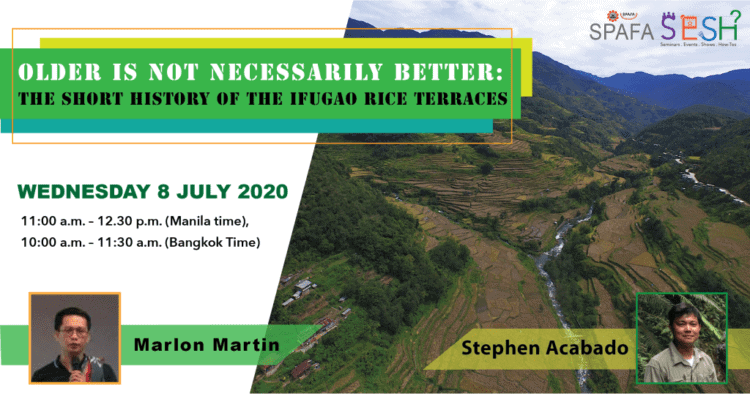via SEAMEO SPAFA: Readers may be interested in this online discussion organised by SEAMEO SPAFA next week (8 July) with Stephen Acabado and Marlon Martin about the recent discoveries at the Ifugao terraces and how their new dates force a re-think of Philippine history. The discussion will be streamed live on SPAFA’s Facebook page. Disclosure: Most of you already know that I work at SEAMEO SPAFA in my day-job employer, and I am organising this event as part of my regular duties.
The long-held belief in the age of the Ifugao Rice Terraces, pegged at ca. 2000 years, as proposed by pioneer anthropologists of the Philippines Henry Otley Beyer and Roy F. Barton has become a sort of received wisdom among Filipinos. It has been taken as a gospel truth, that even the UNESCO enlistment of the agricultural wonders highlights its long history narrative. It is no wonder then, that recent archaeological and ethnohistorical discoveries that suggest a short history origin of the terraces have become an anathema to nationalist sentiments about age of the terraces. In this presentation, we provide the scientific bases for the later dating of the terraces. By doing so, we argue that the shift to wet-rice cultivation (and the inception of rice terracing traditions) in Ifugao, Philippines was a conscious decision by the Ifugao to counter the Spanish conquest. This contention empowers Ifugao communities and forces us to rethink dominant Philippine historical narratives.
Source: Older is not Necessarily Better [Facebook Live and Zoom]












![[Talk] The Ancient Town of Si Thep in Thailand: A Crossroads of Indianization](https://www.southeastasianarchaeology.com/wp-content/uploads/2024/07/the-ancient-town-of-si-thep-in-thailand-a-crossroads-of-indianization-502-120x86.jpg)












